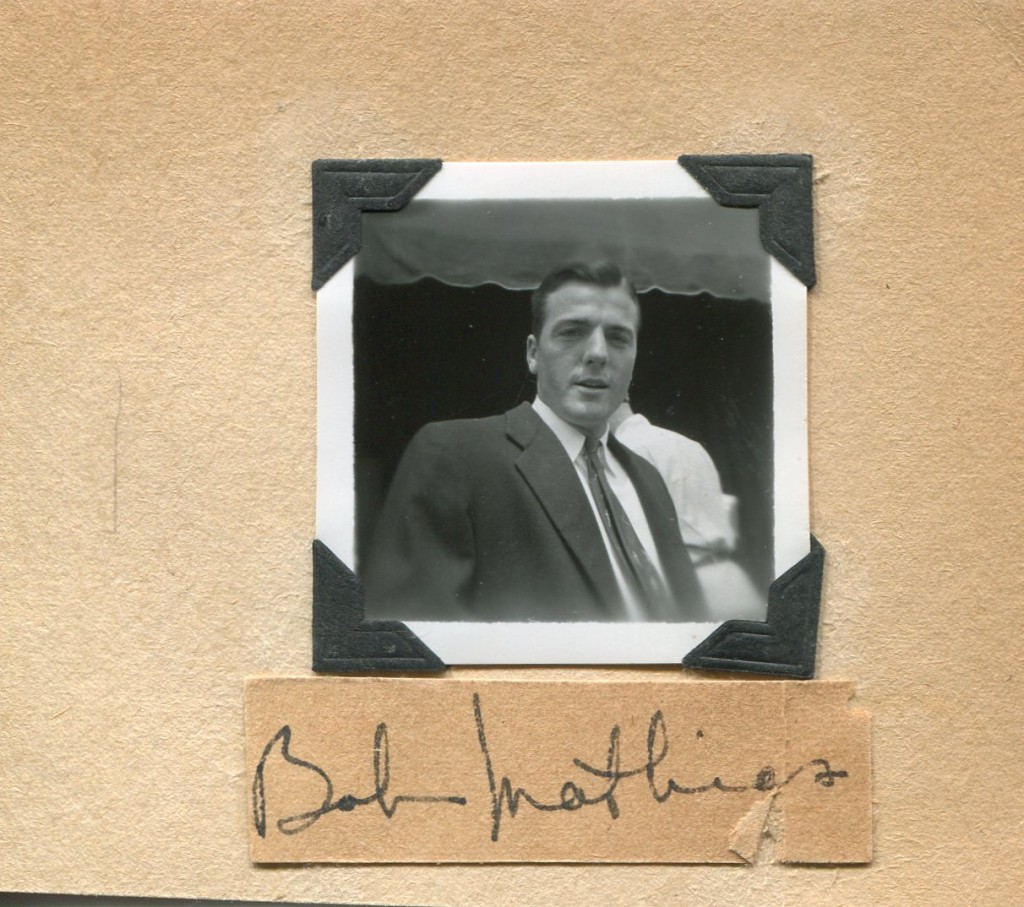
Bob Mathias was an American athlete who was a two time Gold medal winner who also acted on film. He starred as himself in “The Bob Mathias Story” and appeared on television in “The Troubleshooters”. He died in 2006 at the age of 75.
“Guardian” obituary:
Bob Mathias, who has died of cancer aged 75, was the greatest in the long line of American decathletes who dominated the event at international level for the four middle decades of the 20th century. He was the first athlete successfully to defend an Olympic decathlon title, and he remains the youngest man ever to win a track and field gold medal.
Mathias’s emergence as a decathlete on to the postwar scene was the stuff of schoolboy fiction. His high-school track coach in Tulare, an unremarkable town in central California, was sufficiently impressed by the raw strength and speed of his football and basketball that he suggested, as late as the spring of 1948, that his pupil might be happy with the challenge of the decathlon, the ultimate test of all-round athletic prowess and usually the province of experienced and hard-grained campaigners. Mathias was already an accomplished sprinter, high-jumper and discus-thrower, but had never in his life thrown the javelin or long-jumped seriously – and had not even attempted the pole-vault. However, within a few weeks, working mainly from training manuals, he had made enough progress to win the Southern Pacific Amateur Athletic Union title in Los Angeles. Hectic fundraising in Tulare enabled him and his coach to travel to Bloomfield, New Jersey, and the US national championships, which doubled as the Olympic selection trials. His field-event techniques improving by the day, Mathias beat the reigning champion by a clear 123 points, and the rest of the field by a lot more to earn his place on the US Olympic team.
At the games in London, still three months short of his 18th birthday, he overcame two nervous moments to finish the first day’s competition (100 metres, long jump, shot-put, high jump, 400 metres) in third place. But he unwittingly broke a technical rule in the shot-put, which annulled his best throw, and he came close to elimination at a very modest height in the high jump. The second day (110 metres hurdles, discus, pole vault, javelin, 1500 metres) confronted all the athletes at Wembley stadium with English summer weather at its worst. The competition, already unwieldy because of an unexpectedly high entry – and now handicapped by constant heavy rain – fell disastrously behind schedule. After eight events Mathias had forced his way into the lead, but he was desperately tired and the last two events were among his weakest. By the time the javelin began, officials were using hand-held torches to illuminate the competitors’ run-up; for the culminating 1500 metres, which did not start until 10.30 in the evening, the knee-high lights around Wembley’s dog-track had to be augmented by commandeered cars with headlights blazing to give the runners some idea of where they were putting their feet. Despite grinding out a painfully slow time over the sodden cinder track, Mathias held on to his lead and beat the world’s best.
The tiny knot of spectators who had stayed on to cheer him home included his parents and two brothers. Nine time zones away and clustered for the past two days round every available wireless set, the people of Tulare erupted in celebration; factory whistles and sirens blared for three-quarters of an hour, and a spontaneous parade of cars and trucks clogged up the town and the interstate highway for three hours. The hero himself was so exhausted that he had to be woken by team officials the next afternoon to ensure he reached the medal ceremony on time. Later that year Mathias received the annual Sullivan award as the outstanding amateur sportsman in the US and took his place at Stanford University, where his athletics shared the stage with gridiron football; as fullback he featured prominently in Stanford’s victory over the University of Southern California which took them to the 1952 Rose Bowl, a further manifestation of his extraordinary sporting versatility. By now the rough edges of Mathias’s teenage track performance had been smoothed out, and he was indisputably the most accomplished decathlete in the world. He had broken the 14-year-old world record in 1950, and he improved on it at his own home track a month before the 1952 Olympic Games in Helsinki. Here there was never a doubt. Mathias broke his own world record yet again to take his second decathlon gold medal – a double that has been achieved by only one other athlete, Britain’s Daley Thompson – by the almost unbelievable margin of 912 points.
Mathias retired from international athletics at the absurdly young age of 21, quickly made $50,000 from advertising appearances, served for a while as an officer in the US marines, took up acting – his six undistinguished films included The Bob Mathias Story (released in Britain as The Flaming Torch), in which he played the lead – and married his childhood sweetheart. In the 1960s he turned to politics. He served four terms as a Republican congressman for California – concentrating on environmental affairs, but displaying a breadth of interests that saw him serve on the house agriculture and foreign affairs committees – until, like many of his Republican colleagues, he lost his seat in the 1974 Democrat landslide in the wake of Watergate. He was subsequently appointed director of the US Olympic Training Centre, and before his retirement he ran the National Fitness Foundation. He is survived by his second wife and four children.
· Robert Bruce Mathias, athlete and politician, born November 17 1930; died September 2 2006.
The above “Guardian” obituary can also be accessed online here.

